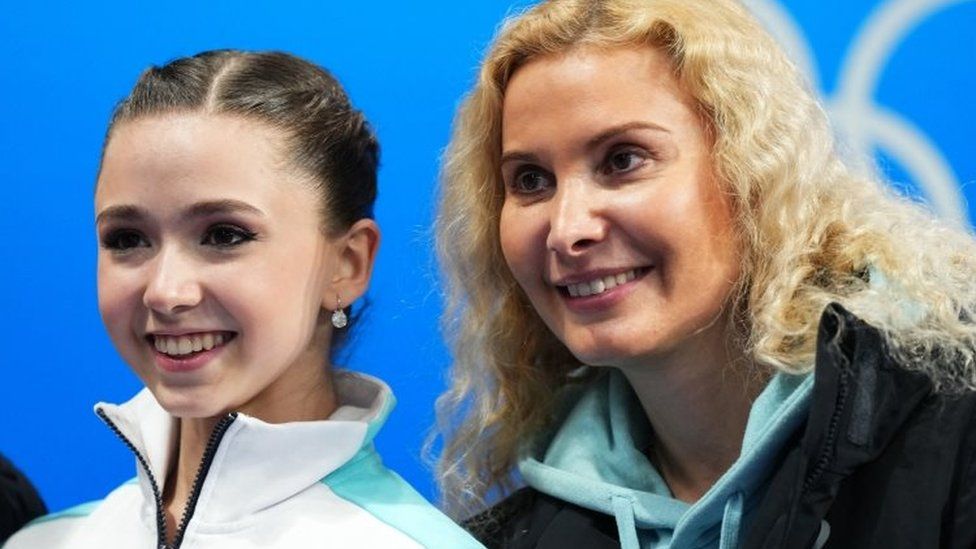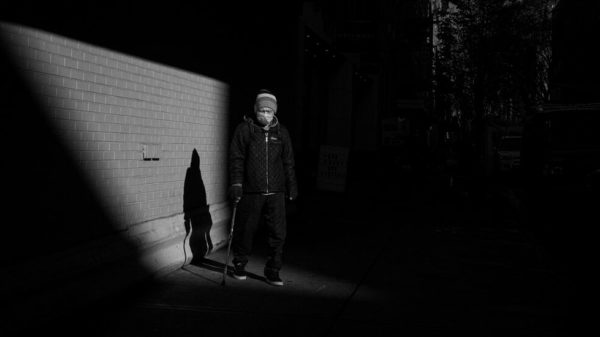This video can not be played
To play this video you need to enable JavaScript in your browser.
Kamila Valieva was never going to have a low-key Winter Olympics.
The Russian figure skater came to the Beijing Games having set world records and after a dominant 2021, including winning the Russian and European Championships. She’s still only 15, and sometimes appears at media conferences holding a favourite stuffed rabbit toy.
Last week, she helped the Russian team to gold in the team event, where she became the first female skater to land a quadruple jump at the Olympics.
But she was never presented with the gold. After days of rumour, it was confirmed she had tested positive for a banned substance.
Valieva has been cleared to compete in the rest of the Games, where she will start as favourite in the women’s individual figure skating.
The case has raised questions about the adults around her and over Russia’s record of doping in elite sports competitions. But at the centre of the controversy is a teenager who made her senior debut just months ago.
For Valieva, becoming an Olympic champion fulfils a childhood dream. “I’ve probably been telling my mom since I was three, ‘I want to become an Olympic champion!'” she said.
Born in Kazan, Russia’s Tatarstan Republic, Valieva started skating at three, also practicing ballet and gymnastics. But her mother wanted her to choose one sport so she opted for skating. They moved to Moscow when Valieva was six.
She trains under Eteri Tutberidze, who has coached several skaters in to international success – but whose methods have been criticised as unduly harsh. Several former students retired early.
Valieva has spoken positively about working with Tutberidze, telling Russian magazine La Personne “we need a coach like Eteri”.
She also gave a candid assessment of what it takes to reach the very top of competitive sport.
“Figure skating starts very early, at the age of three or four,” she told La Personne.
“The child must be taken to training, first three times per week, then four times, and then six times per week. And this is not for a year or two. For example, I have been training for 12 years. Parents have no days off, no holidays, no vacation, that is, they practically need to give up their life.”
As a junior competitor, she skated a routine inspired by a Picasso painting, prompting an admiring message from the painter’s granddaughter Diana.
Another programme was dedicated to the memory of her late grandmother, saying the feelings she has when thinking of why she is skating give her a lot of energy to perform.
Valieva has admitted being uncomfortable with the attention her success has brought, telling IFS Magazine: “I don’t like that very much, but I know that it is there and I try to prepare for it”.
However she thanked fans, one of whom gave her a Pomeranian puppy.
Before she came to the Olympics she was already a well-known in the figure skating world, combining artistry with the ability to land the most difficult moves.
The quadruple jump is a rarity in the women’s sport, and was only introduced in the men’s competition at the end of the 80s.
It requires competitors to jump, twist four times in less than a second and land on a single blade backwards.
When Valieva performs the move, she stays bolt upright – it is a bit like watching a corkscrew float through the air. Biomechanist James Richards told Scientific American he does not think it is possible for a skater to turn anymore in the air.

Beyond the ice rink, Valieva has said she hopes to travel, learn languages or ride a motorcycle. She’s also said she might become a psychologist.
“But… all this and much more – later,” she told La Personne. “Now only figure skating.”
Russian delight that Valieva has been allowed to compete in the individual event this week has been matched by dismay among other Olympic bodies and athletes.
The Court of Arbitration for Sport (Cas) cited her age as one of the reasons why it made the decision. World anti-doping agency Wada said it was “disappointed” by the move.
Still, there remains widespread sympathy for Valieva. The Global Athlete Group said the fact she had tested positive “is evidence of abuse of a minor. Sport should be protecting its athletes, not damaging them.”
Germany’s former figure skater Katarina Witt said Valieva was “not to blame here”.
“As an athlete, you always follow the advice of your confidants, in this case she probably followed her coach and medical team,” Witt wrote on Facebook. “You are taught from a very young age to trust them.”
“No doping would have helped her to land these (quads)!!!” she added.













